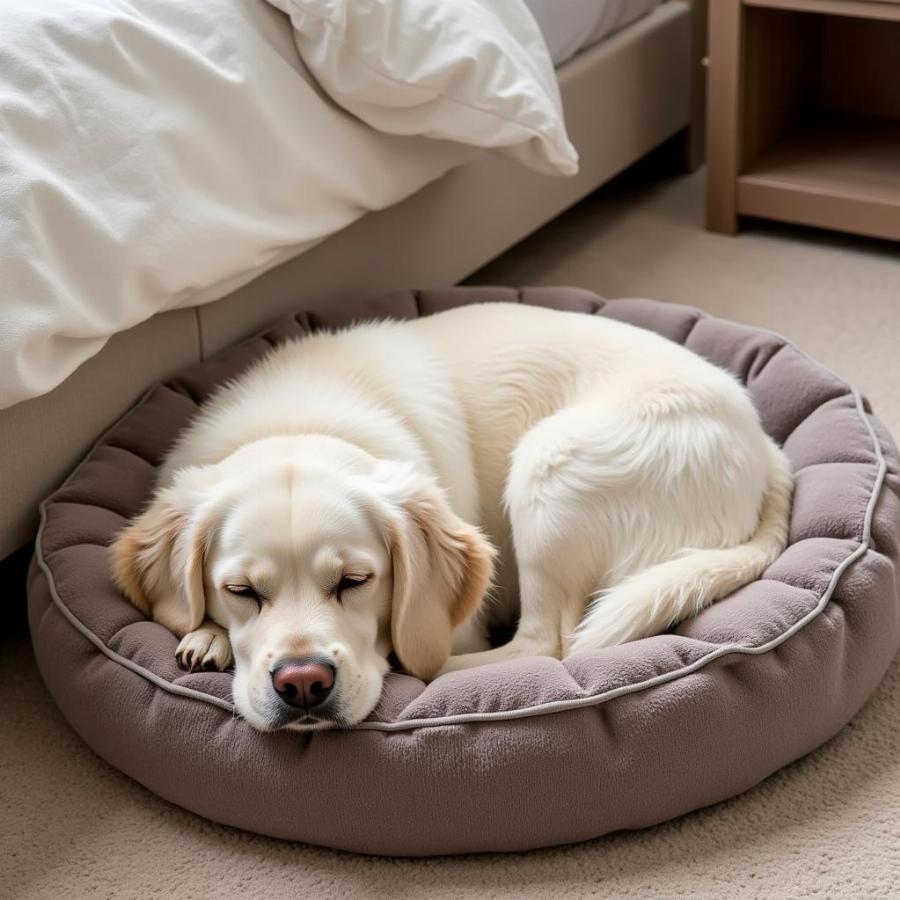Sharing your bed with your furry best friend is a topic that sparks plenty of debate among dog owners. Some wouldn’t have it any other way, relishing the warmth and companionship their dog brings. Others shudder at the thought, citing potential hygiene issues and sleep disruptions. So, where does the truth lie? Is it a harmless indulgence or a recipe for restless nights and behavioral problems?
This article delves into the pros and cons of letting your dog sleep with you, examining both the potential benefits and drawbacks. We’ll explore the science behind the human-animal bond in the bedroom and equip you with the knowledge to make an informed decision that suits your lifestyle and your dog’s needs.
The Pros of Sharing Your Sleep Space
Let’s face it, there’s something undeniably comforting about having your dog snuggled up beside you. But beyond the feel-good factor, are there actual advantages to co-sleeping with your canine companion?
- Enhanced Feelings of Safety and Security: Dogs are natural protectors, and their presence in the bedroom can create a sense of security and comfort, especially for people who live alone or experience anxiety.
- Reduced Stress and Anxiety: The rhythmic breathing and warmth of a dog can be incredibly soothing, promoting relaxation and reducing feelings of stress. Studies have shown that physical contact with pets can lower cortisol levels (the stress hormone) and release oxytocin (the “love hormone”).
- Improved Sleep Quality (for some): While this is subjective and depends on the individual and the dog, some people find that having their dog in bed provides a sense of calm and companionship, leading to better sleep.
The Cons: When Sharing a Bed Might Not Be Ideal
While the benefits of sharing your bed with your dog can be tempting, there are also potential downsides to consider.
- Sleep Disruptions: Dogs are naturally active sleepers – they dream, twitch, and sometimes even bark in their sleep, which can lead to fragmented sleep for you.
- Exacerbating Allergies and Respiratory Problems: If you suffer from allergies or respiratory issues, having your dog in bed could worsen your symptoms.
- Behavioral Issues: Allowing your dog to sleep in your bed could lead to territorial behavior or even aggression in some cases. It can also make it more challenging to establish boundaries and routines.
Factors to Consider Before Inviting Your Dog into Bed
Making the right decision for you and your dog requires careful consideration of your individual circumstances.
- Your Dog’s Sleep Habits: If your dog is a restless sleeper or prone to accidents during the night, sharing a bed might not be the best idea.
- Your Health: Consider your own health conditions, especially allergies or respiratory problems, before making a decision.
- Your Dog’s Behavior: Be honest about your dog’s temperament. If they guard resources or display possessive behaviors, allowing them in your bed could exacerbate these issues.
 A Contented Dog Sleeping in a Cozy Dog Bed
A Contented Dog Sleeping in a Cozy Dog Bed
Tips for a Harmonious Night’s Sleep (With or Without Your Dog)
- Establish a Consistent Sleep Routine: This is crucial for both you and your dog. Go to bed and wake up around the same time each day to regulate your sleep cycles.
- Create a Comfortable Sleep Environment: Ensure your bedroom is dark, quiet, and cool for optimal sleep.
- Provide a Designated Sleep Space for Your Dog: Even if you allow your dog in your bed sometimes, having their own comfortable bed is essential. This gives them a sense of security and a place to retreat to when they need some space.
When to Consult a Professional
If you’re struggling with pet-related sleep issues or your dog’s behavior changes after you start or stop allowing them in your bed, it’s best to consult with your veterinarian or a certified dog trainer or behaviorist.
FAQ
Q: My dog sleeps in my bed, and now they growl when I try to move them. What should I do?
A: Resource guarding, even of a sleeping spot, should be addressed with a professional trainer. They can help you modify this behavior safely and effectively.
Q: Will letting my puppy sleep in my bed cause separation anxiety later?
A: There’s no direct correlation. Separation anxiety stems from various factors, and it’s crucial to establish healthy independence in puppies regardless of their sleeping arrangements.
Q: Is it unhygienic to let my dog sleep in my bed?
A: It depends. Regularly wash your bedding, keep your dog clean and groomed, and consult your doctor if you have allergy concerns.
Still Wondering if Your Bed is the Right Place for Your Dog?
Choosing whether to allow your dog to sleep in your bed is a personal decision. By carefully considering your circumstances, your dog’s needs, and the information presented in this article, you can make the best choice for a peaceful night’s sleep for both of you.
If you’re still unsure, remember that providing your dog with love, attention, and a safe and comfortable sleeping space is what truly matters.
For more helpful tips on dog care, training, and behavior, be sure to check out our other articles on dogs and cats living together mass hysteria, surgical onesie for dogs, my dog keeps biting his back till it bleeds, l theanine dogs, and calming scents for dogs.
About Beaut Dogs
Need expert advice on all things dog-related? Beaut Dogs is your one-stop resource for reliable and insightful information about the wonderful world of dogs. From breed guides to care tips, we’re here to help you navigate the joys and responsibilities of dog ownership. When in doubt, reach out to us at [email protected] and let our team provide you with accurate and helpful guidance.